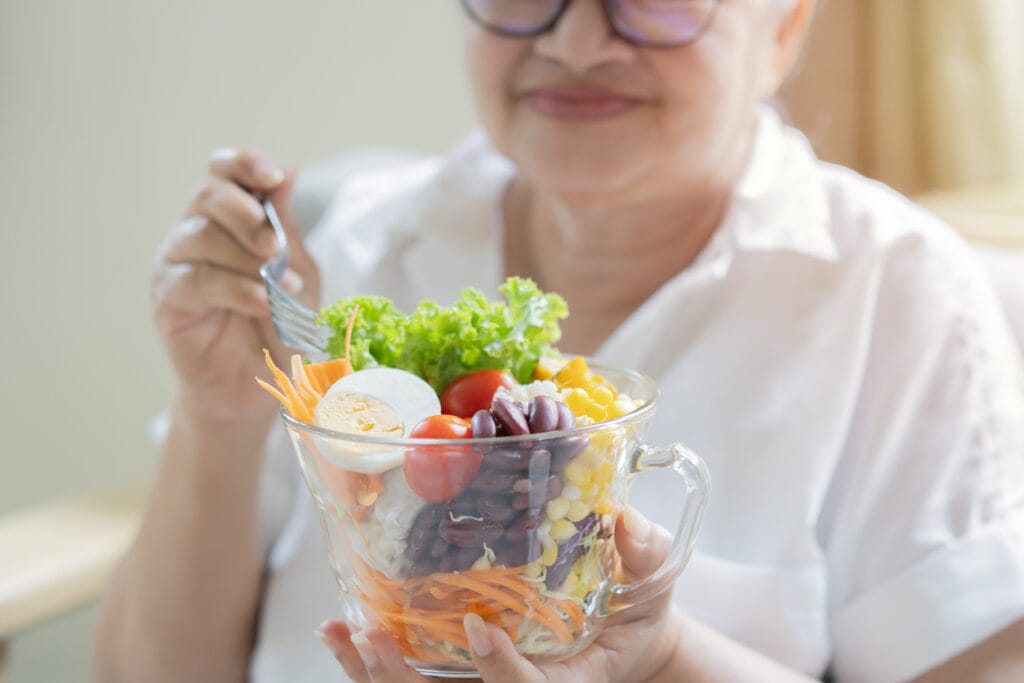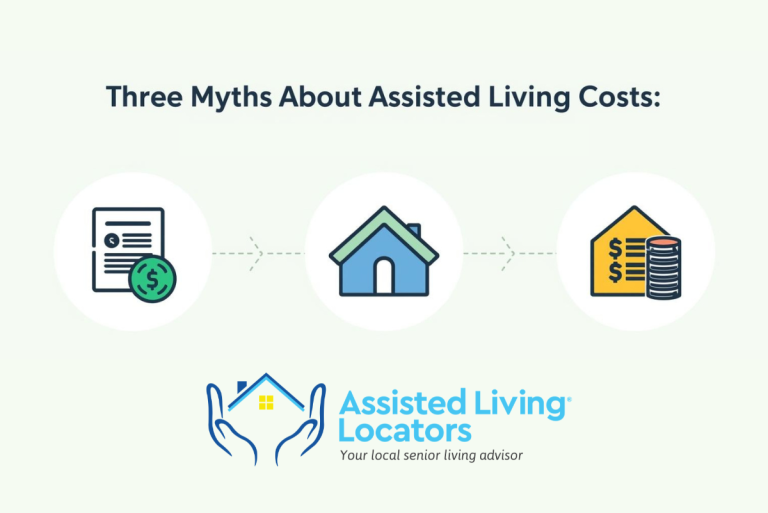Ensuring proper nutrition for elderly loved ones is crucial as their nutritional needs change with age, impacting their overall health, energy levels, and mental clarity. Family caregivers play a vital role in managing these needs, often facing challenges like changing appetites and dietary restrictions. This blog aims to equip caregivers with practical tips and valuable information to help them navigate senior nutrition effectively, ultimately enhancing the well-being and quality of life for the seniors they care for.
Changes in Metabolism and Nutritional Requirements
It’s important to understand how your loved ones' metabolism changes with age. Metabolism naturally slows down, meaning the body requires fewer calories to function. However, this doesn’t mean their nutritional needs diminish.
Instead, the focus should shift to nutrient-dense foods that provide essential vitamins, minerals, and proteins without excessive calories. Adjusting their diet to include smaller, more frequent meals that are rich in nutrients can help maintain their energy levels and overall health.

Common Nutritional Deficiencies in Older Adults
Due to reduced sun exposure and changes in dietary needs, older adults are at higher risk for certain nutritional deficiencies, such as vitamin D, which can weaken bones, and vitamin B12, which can lead to memory problems and fatigue.
These deficiencies can often go unnoticed because their symptoms mimic those of aging itself, including unexplained fatigue, frequent infections, and changes in mood or cognition. To prevent these issues, a balanced diet is crucial, and consulting a doctor or registered dietitian can help create a personalized plan to address any specific nutritional needs, such as those provided by West Hartford Health & Rehabilitation Center.
Special Dietary Considerations
Seniors often have unique dietary needs, particularly when managing chronic conditions. Tailoring their diet can make a significant difference in their health and quality of life. This guide explores how to manage chronic conditions through diet and emphasizes the critical importance of hydration.
Managing Chronic Conditions Through Diet
Chronic conditions like diabetes, hypertension, and heart disease require careful dietary management to keep symptoms in check and improve overall health.
- Diabetes: For seniors with diabetes, it's essential to monitor carbohydrate intake to maintain stable blood sugar levels. Opt for whole grains, vegetables, and fruits with a low glycemic index. Avoid or limit refined sugars, sugary drinks, and high-carb snacks.
- Hypertension: A diet low in sodium can help manage high blood pressure. Encourage foods rich in potassium, like bananas, oranges, and leafy greens, while reducing salt intake. Processed foods and canned soups are often high in sodium and should be limited.
- Heart Disease: For those with heart disease, focus on heart-healthy fats like those found in avocados, nuts, and olive oil. Reduce intake of saturated fats and trans fats found in fried foods, baked goods, and processed snacks. Including plenty of fruits, vegetables, and whole grains can also support heart health.
Importance of Hydration
Hydration plays a vital role in maintaining senior health, impacting everything from digestion to cognitive function. Dehydration can lead to serious complications, especially in older adults.
- Role of Fluids: Fluids help regulate body temperature, maintain blood pressure, and support kidney function. They are also crucial for digestion and preventing constipation, which is a common issue among seniors.
- Tips for Encouraging Fluid Intake: Seniors may not always feel thirsty, making it important to encourage regular fluid intake. Offer a variety of beverages, including water, herbal teas, and fruit-infused water, to make drinking more appealing. Soups, fruits, and vegetables with high water content, like cucumbers and watermelon, can also contribute to hydration.
Practical Tips for Family Caregivers
Caring for an elderly loved one includes ensuring they receive nutritious meals that are both appealing and enjoyable. Here are some practical tips to help with planning, preparing, and enhancing meal times.
Planning and Preparing Nutritious Meals
Planning and preparing nutritious meals can seem daunting, but with a few strategies, it becomes manageable and rewarding.
Strategies for Meal Preparation
- Create a Weekly Menu: Plan meals ahead of time to ensure a balanced diet throughout the week. Include a variety of fruits, vegetables, lean proteins, and whole grains.
- Batch Cooking: Prepare larger quantities of meals and freeze portions for later use. This saves time and ensures there’s always a healthy meal available.
- Use Convenient Appliances: Slow cookers, pressure cookers, and blenders can simplify meal preparation, making it easier to create nutritious meals with minimal effort.
Involving your loved ones in meal planning can boost their appetite and make them feel valued. Ask for their input on favorite dishes, encourage them to help with simple tasks like washing vegetables, or let them choose between meal options. This participation can make mealtime more enjoyable and cater to their preferences and nutritional needs.
Making Meals Enjoyable and Appealing
Enhancing the dining experience can significantly improve your loved one's appetite and overall enjoyment of meals.
Tips for Enhancing the Dining Experience
- Set the Table Nicely: Use attractive table settings, play soft background music, and create a pleasant atmosphere to make mealtime special.
- Eat Together: Sharing meals can make eating more enjoyable and provide valuable social interaction. It also allows you to monitor their eating habits and ensure they are consuming enough nutrients.
Ideas for Varied and Interesting Meals
- Experiment with Recipes: Try new recipes that incorporate different flavors and textures. This can prevent mealtime from becoming monotonous and encourage a more varied diet.
- Seasonal Ingredients: Use seasonal fruits and vegetables to add variety and freshness to meals. Seasonal produce often tastes better and can be more affordable.
- Themed Meals: Occasionally, create themed meals based on different cuisines or holidays to make dining fun and exciting.
Overcoming Common Challenges
Caring for an elderly loved one involves navigating various challenges related to their diet and nutrition. Here, we address common issues such as decreased appetite, dental and swallowing problems, and managing dietary restrictions while respecting food preferences.
Dealing with Decreased Appetite and Taste Changes
Many seniors experience a loss of appetite or changes in their sense of taste, which can make meal times challenging.
- Solutions for Appetite Loss and Taste Changes: To combat appetite loss, offer smaller, more frequent meals instead of three large ones. This can make eating less overwhelming and help maintain their nutritional intake. Enhance flavors with herbs, spices, and healthy sauces, avoiding excessive salt and sugar but adding natural seasonings to improve taste. Make meals visually appealing with colorful fruits and vegetables, as a dish that looks good can stimulate the appetite.
- Nutrient-Dense Food Options: Focus on nutrient-dense foods to ensure they get the necessary vitamins and minerals even if they eat less. Include options like avocados, nuts, seeds, lean meats, dairy products, and fortified cereals. Smoothies and soups can also be nutrient-packed and easier to consume.

Addressing Dental and Swallowing Issues
Dental problems and swallowing difficulties are common in seniors and can impact their ability to eat comfortably.
- Modifying Diets for Dental Health and Swallowing Difficulties: Choose soft foods like mashed potatoes, yogurt, applesauce, and cooked vegetables that are easier to chew and swallow. Cut food into small pieces or puree meals to make them easier to handle, helping prevent choking and ensuring they get enough nutrition.
- Suitable Food Textures and Preparations: Prepare moist foods to aid swallowing by adding gravies, sauces, or broths to make dry foods more manageable. Avoid tough meats, hard bread, and sticky foods that can be difficult to chew and swallow.
Managing Dietary Restrictions and Food Preferences
Balancing dietary restrictions with food preferences can be tricky but is essential for maintaining their health and happiness.
- Navigating Dietary Restrictions: Find suitable substitutes for restricted foods, such as low-sodium alternatives for those with hypertension or gluten-free options for those with celiac disease. Be vigilant about reading food labels to avoid restricted ingredients and ensure the food meets their dietary needs.
- Balancing Preferences with Nutritional Needs: Create flexible meal plans that incorporate their favorite foods within dietary guidelines to ensure they enjoy their meals and stick to their nutritional requirements. Regularly discuss food preferences and any changes in taste or appetite to adjust the diet plan to their current needs and preferences.
Encouraging Healthy Eating Habits
Fostering healthy eating habits in seniors is essential for their well-being and quality of life. Here are some strategies to establish regular meal times, encourage social dining, and adapt to their changing dietary needs.
Establishing Regular Meal Times
Consistent meal schedules can greatly benefit seniors by promoting better digestion and nutrient absorption. Regular meal times help regulate appetite, stabilize blood sugar levels, and ensure that seniors receive balanced nutrition throughout the day. This routine can also provide a sense of structure and normalcy, which is especially important for those with cognitive impairments.
Tips for Maintaining Routine
- Set Specific Times: Establish specific meal times and stick to them as closely as possible. This helps create a predictable routine.
- Plan Ahead: Prepare meals in advance to reduce stress and ensure that nutritious options are always available.
- Use Reminders: Use clocks, timers, or alarms to remind both you and your loved one when it's time to eat.
Monitoring and Adapting to Changing Dietary Needs
As our loved ones age, their dietary needs may change. It's important to continuously monitor and adapt their diet to meet these evolving needs.
Observing and Adjusting to Seniors' Evolving Needs
- Stay Attentive: Pay attention to changes in appetite, weight, and overall health. These can be indicators that dietary adjustments are needed.
- Seek Feedback: Regularly ask your loved one about their food preferences and any difficulties they may be experiencing with eating.
Continuous Evaluation and Modification of Diets
- Consult Professionals: Work with healthcare providers or a nutritionist to ensure your loved one's diet meets their current health requirements.
- Adjust Portions: Modify portion sizes and food types based on their nutritional needs and any medical conditions they may have.
- Incorporate Variety: Ensure the diet includes a variety of foods to provide all necessary nutrients and prevent mealtime boredom.
According to the National Institutes of Health, regular meal times can help improve weight management, reduce the risk of chronic diseases, and enhance overall health in older adults.





